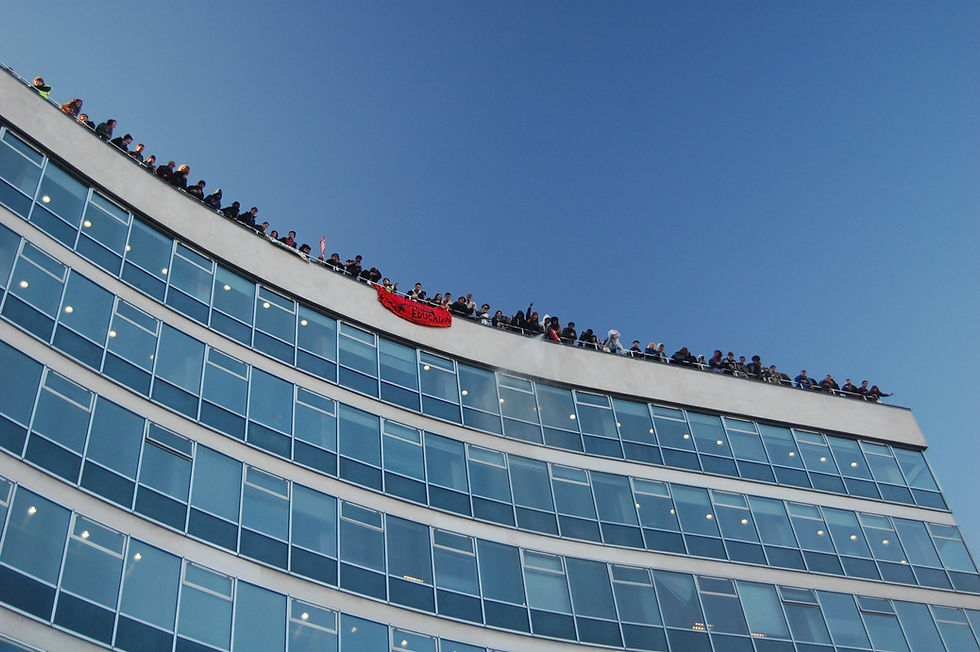Immigrants are the Scapegoats of the 21st Century
- Steffany González

- Jun 9, 2025
- 5 min read
Updated: Jun 10, 2025

Immigration is a blade political parties swing against each other all the time. You either support it – with limitations – or you are against it. In either case, the humanitarian discourse is rarely the main focus for letting immigrants in, instead it is always about what they can contribute to the wealth of a country, about their usefulness. Do they come to work? to study? to invest? or, on the contrary, are they here to steal our jobs? to murder and to benefit from public aid?
Putting aside the fact that borders are a human made construct created to facilitate the administration of a territory, thus the idea of citizenship is merely an illusion and it should not limit a person’s freedom of movement, migration compounds a series of rules we humans have to strictly follow to fulfil our natural desire for relocation. Since the beginning of time, humans have migrated from one place to another looking for better living conditions. And not just humans. Imagine observing a flock of birds that, when performing their natural migration from one territory to another, descended and queued at the border, each submitting to a stamp on some feather or other in order to enter. It is just absurd. Even animals do not confine themselves to the place they were born. Still, if you are unlucky enough in the game of life and end up being born in a war zone or severely impoverished country and your survival instincts push you to relocate, you not only are facing the pain and fear of leaving everything you know behind, but you are also positioning yourself to be rejected and exploited by other humans beings who may not understand your need for change.
One of the primary anti-immigration arguments claims that immigrants commit more crimes than native citizens. Some immigrants immerse themselves in the underworlds of their new home, of course, but any idea of an inclination to illicit acts is a fallacy. Criminality, like many other mundane activities, is affected by classism. A poor and vulnerable person is more likely to engage in certain kinds of illegal practices than a rich, secure person. These practices are extremely risky, the product of unenviably precarious conditions, and targeted by authorities as a matter of security and political theatre. They are only easy to fall into when you lack basic means and the hope of better opportunities to come. The same cannot be said of rich, privileged people, who are much likelier to embark on careers of criminality by choice, and have whole fields of criminality only open to them.
Native citizens in power - be they racial, economic, political or gender power relations - are also capable of illegality. Their crimes, despite being equally damaging to society, are often overlooked. “White-collar crimes” are crimes committed by business owners or government professionals that typically do not involve in physical violence, therefore disappearing under the radar. Simply put, a rich white man has no need to rob people on the streets to increase his fortune, when he can use his influence and inconspicuous character to cheat the system. Knowledge of their country’s law, societal norms and connections are an advantage to get what they want. A typical white-collar crime is avoiding taxes, for instance.
Even when caught white criminals, by virtue of the manner in which they have sculpted media environments and legal precedents, rarely face the consequences. Take Trump’s case: the man has been twice a US president despite myriad allegations of sexual assault and more than 80 criminal charges, not to mention 34 convicted felonies.
Each time a headline informs on a crime, it is common to receive an avalanche of comments inquiring about the nationality of the perpetrators. When the criminals are native, they are either assumed to be of foreign descent or they get socially redeemed from their crimes. I once stumbled upon a man who asked about the origin of a criminal in the UK, when notified about their Britishness, he then proceeded to brush the severity of his acts off by replying that at least the criminal was paying his taxes. Ridiculous as it might sound, the same train of thought is present in many politicians' minds nowadays. As the saying goes: better the devil that you know… but, why does paying taxes interfere with accountability? There is a disconcerting link in the collective imagination between state contribution and human rights.
A perfect example of this are visas. Via visas, states restrict the type of immigration their country is willing to receive, conceding facilities to certain individuals to attain residence rights. Digital nomads, UK visas with a minimum income requirement and Australian-style point-based systems focus on the rentability of immigration. The right type of immigrant is highly educated, skilled, experienced and financially tested, qualities hoped to ensure a future beneficial contribution to the economy. Despite the ongoing discourse on immigration being out of control, no one bats an eye when immigrants are rich.
Take for example Trump’s brand new Golden Visas: get an American visa for the reasonable price of $5 million! The message is clear: you can stay, as long as you are wealthy. In capitalism, everything is for sale, even your rights. If you want residency, you have to earn it from the state.
Although you can legally buy your visa, you cannot buy people’s acceptance. To gain societal approval, immigrants must demonstrate some level of value-sharing with the locals, a game thoroughly tilted in favour of white westerners. Today, there is no reward for playing by their rules by entering their country legally, for, as long as you are different from them, you will still be persecuted. Add a dose of dystopian propaganda on deportation and you get the perfect mixture of psychological terror a 21st immigrant has to endure daily.
In short, an immigrant is valuable insofar as they contribute to the accumulation of state wealth. Criminality is not a direct consequence of immigration, but white impunity makes it seem as if it is. Immigration is not being perceived as a humanitarian effort or human right, but rather being used as a tool. For those of you who feel threatened by immigrants: we ask for and take so little. We do not steal your jobs. A native person is more likely than an immigrant to be hired for a higher-position job in their own country, and immigrants tend to start their own businesses, contributing positively to economic growth. When we do take on jobs, we fill low-skilled labor areas that no natives want, often subject to low wages and precarious working conditions. In most cases, we are ineligible for public benefit programs and, when we do get financial aid, we receive lower rates than native-born citizens. Look up: it is your own richer countrymen who like to take up your space so they can sprawl themselves in your discomfort.
Illustration by Will Allen/Europinion
.png)



Comments